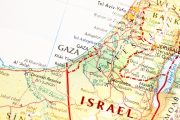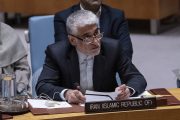
On November 19, Russian state media channel Rossiya-1 reported that President Vladimir Putin will join a virtual G20 summit on Wednesday, November 22, that India is organizing.
Earlier in September, the Russian leader did not attend the “Group of 20” summit in New Delhi.
“Next week, a virtual G20 summit will be held and Vladimir Putin is expected to attend,” the national broadcaster reported, elaborating that the event may be “the first occasion in a long time” that the Russian president and Western leaders would co-participate.
Moreover, Putin was not invited to the Asia-Pacific Economic Cooperation (APEC) summit held earlier this week in San Francisco. Based on Marat Berdyev, the Russian Foreign Ministry’s ambassador-at-large and a senior official at APEC, the United States had stated that, as host of the event, “it was not going to invite a number of leaders due to the fact that they are subject to sanctions restrictions.”
In October, Putin participated in a Belt and Road forum in China, where he personally met Hungarian Prime Minister Viktor Orbán for the first time since Russia’s accumulating disputes with Ukraine erupted in fighting in February 2022. After Putin’s meeting with the Hungarian leader, ambassadors to Hungary from NATO member states conducted an unscheduled “emergency meeting” in Budapest.
In March, the ICC issued an “arrest warrant” for Putin, stating that he was “allegedly responsible for war crimes” and formally accusing him of abducting Ukrainian children. Moscow has dismissed the allegations as false and called the ICC politically compromised. Russia’s Investigative Committee has opened a criminal case against the ICC’s chief prosecutor and the judges who ruled against Putin.
The ICC decision became the first time an international court issued an arrest warrant for the leader of one of the five permanent members of the UN Security Council.
On November 21, Putin was scheduled to have an emergency video conference with other BRICS leaders regarding the ongoing conflict intensification between Israel and Hamas, the Kremlin announced on November 20. No further information was provided regarding the video conference.
Earlier on November 20, the office of South African President Cyril Ramaphosa declared that he will conduct an extraordinary joint meeting on the worsening situation in Gaza. South Africa presently chairs the BRICS group, which also includes Russia, China, Brazil, and India.
Apart from the regular BRICS members, leaders of Saudi Arabia, Argentina, Egypt, Ethiopia, Iran, and the United Arab Emirates were invited to join the event.
All the participants will contribute to discussions on the “current humanitarian crisis in Gaza,” the presidential office’s statement said, adding that the leaders will then adopt a joint statement on the issue. Additionally, UN Secretary General António Guterres will join the meeting, the statement continued.
Israel has been conducting a major military operation in Gaza for more than a month now in response to a surprise brutal attack on October 7 by Hamas, which killed some 1,200 Israelis, mostly civilians. More than 200 people were also taken hostage by the militants.
Israel responded to the attacks with a widespread bombing campaign against Gaza as well as a ground operation. The death toll as a result of the Israeli actions in Gaza has surpassed 11,000, the Gaza Health Ministry has claimed.
Russia has repeatedly called for a speedy ceasefire in Gaza. Earlier this week, Russian Foreign Minister Sergey Lavrov told news outlet Russia Today (RT) that the only way to end Israeli-Palestinian violence was via the UN-backed framework of a two-state solution that necessitated sincere efforts from all parties to enforce.
Putin did not attend the BRICS economic summit in South Africa in August, despite being invited, owing to the ICC arrest warrant.
On November 20, Diana Mondino, senior economic adviser to Argentine President-elect Javier Milei, told Sputnik Brazil that Argentina was not planning to become a member of BRICS on January 1. Argentina’s prior request to join BRICS was approved in August, along with the requests of Egypt, Ethiopia, Iran, Saudi Arabia, and the United Arab Emirates.
“I don’t know why there is so much interest around BRICS,” Mondino said, adding that it remained uncertain as to how joining the group would benefit Argentina.
The candidate for Argentine foreign minister also said that the country’s government will “analyze” if joining the organization would reap benefits for the country.
Milei, who defeated Economy Minister Sergio Massa in his country’s presidential runoff on November 19, had previously opposed joining BRICS. He has also voiced hesitancy to support economic ties with China and Brazil amid efforts to work toward economic rapprochement with the United States and Israel.
“I’m not going to push for deals with communists because they don’t respect the basic parameters of free trade, freedom, and democracy; it’s geopolitics,” Milei said in August, adding that “some countries are not along those lines.”
Also, Milei pledged not to interfere with Argentine businesses that are involved with the BRICS countries. Besides, he has vowed to “dollarize” the Argentinian economy.
Joining the BRICS group was viewed as an opportunity to open up a “new scenario” for Argentina, outgoing President Alberto Fernandez declared back in August after accepting the invitation.
Milei has promised “shock therapy” to address his country’s embattled economy, which has been hit by one of the world’s fastest inflation rates and a looming recession, Bloomberg reported on November 20.
Argentina has to deal with a debt of $44 billion due to be paid to international bondholders and the International Monetary Fund next year. To tackle the arrears, the country will need “a big current account surplus amid a stabilization plan,” Martin Castellano, head of Latin America research at the Institute of International Finance, has contended.
The South American nation is presently grappling with the worst economic crisis in decades. Inflation surged 60 percent over the past year alone.




